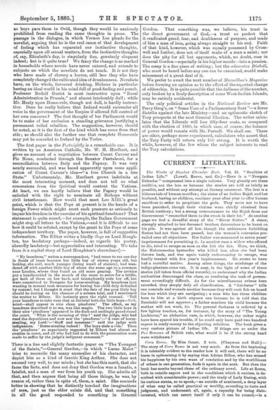CURRENT LITERATURE.
The Works of Shoshee Chunder Dutt. Vol. II. "Realities of Indian Life." (Lovell, Reeve, and Co.) —Here is a " Newgate Calendar " compressed into a single voluke. Very ghastly are these realities, not the less so because the stories are told as briefly as possible, and without any attempt at literary ornament. The first is a hideous tale of human sacrifice ; the sister of an Indian Rajah and her husband, having no children, continue year after year to offer human sacrifices in order to propitiate the gods. They seem not to have been punished, though their victims were chiefly obtained from British territory ; but a strong remonstrance to the Rajah from our Government " reconciled them to the crook in their lot." At another page we find a dreadful story of the " Sister Settee." A sister, strongly attached to her deceased brother, determines to be burnt on his pile. It was against all law, though the ordinances forbidding Settee had not then been passed, but the woman's entreaties pre- vailed over all objections. Her father 'was sentenced to seven years' imprisonment for permitting it. In another case a widow who offered to die, tried to escape as soon as she felt the fire. Here, we think, the Mahommedan bystander who killed her, after she had been thrown back, and was again vainly endeavouring to escape, was hardly treated with five year's imprisonment. He seems to have had a merciful motive. Among other things, the misdoings of the indigo-planters come oat. It is easy, in the light of some of these stories (all taken from official records), to understand why the Indian authorities discouraged the class, as rendering the task of govern- ment exceedingly difficult. As for the miscellaneous crimes here recorded, they simply defy all classification. A "fish-hater" kills one comrade and wounds another because they will cook fish on board the boat which they are navigating ; a man who has three children born to him at a birth exposes one because he is told that the Zemindar will not approve ; a father murders his child because the mother will not work, &c. The general darkness is relieved by a few lighter touches, as, for instance, by the story of "The Young Lochinvar," an abduction case, in which, however, the suitor might have been spared his trouble, if he could only have paid two hundred rupees in ready-money to the objecting relatives. The book gives a very curious picture of Indian life. If things are so under the Paz Romano of British rule, what would it be if the strong hand were withdrawn P


































 Previous page
Previous page